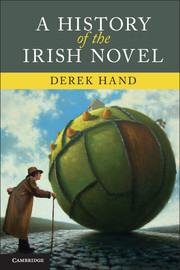Book contents
- Frontmatter
- Contents
- Acknowledgements
- Introduction A history of the Irish novel, 1665–2010
- Interchapter 1 Virtue Rewarded; or, the Irish Princess
- Chapter 1 Beginnings and endings
- Interchapter 2 Beyond history
- Chapter 2 Speak not my name; or, the wings of Minerva
- Interchapter 3 Edith Somerville and Martin Ross's The Real Charlotte
- Chapter 3 Living in a time of epic
- Interchapter 4 James Joyce's Ulysses
- Chapter 4 Irish independence and the bureaucratic imagination, 1922–39
- Interchapter 5 Elizabeth Bowen's The Last September and the art of betrayal
- Chapter 5 Enervated island – isolated Ireland? 1940–60
- Interchapter 6 John Banville's Doctor Copernicus: a revolution in the head
- Chapter 6 The struggle of making it new, 1960–79
- Interchapter 7 Seamus Deane's Reading in the Dark and the rebel act of interpretation
- Chapter 7 Brave new worlds
- Interchapter 8 John McGahern's That They May Face the Rising Sun
- Conclusion The future of the Irish novel in the global literary marketplace
- Notes
- Bibliography
- Index
Interchapter 3 - Edith Somerville and Martin Ross's The Real Charlotte
The blooming menagerie
Published online by Cambridge University Press: 05 June 2012
- Frontmatter
- Contents
- Acknowledgements
- Introduction A history of the Irish novel, 1665–2010
- Interchapter 1 Virtue Rewarded; or, the Irish Princess
- Chapter 1 Beginnings and endings
- Interchapter 2 Beyond history
- Chapter 2 Speak not my name; or, the wings of Minerva
- Interchapter 3 Edith Somerville and Martin Ross's The Real Charlotte
- Chapter 3 Living in a time of epic
- Interchapter 4 James Joyce's Ulysses
- Chapter 4 Irish independence and the bureaucratic imagination, 1922–39
- Interchapter 5 Elizabeth Bowen's The Last September and the art of betrayal
- Chapter 5 Enervated island – isolated Ireland? 1940–60
- Interchapter 6 John Banville's Doctor Copernicus: a revolution in the head
- Chapter 6 The struggle of making it new, 1960–79
- Interchapter 7 Seamus Deane's Reading in the Dark and the rebel act of interpretation
- Chapter 7 Brave new worlds
- Interchapter 8 John McGahern's That They May Face the Rising Sun
- Conclusion The future of the Irish novel in the global literary marketplace
- Notes
- Bibliography
- Index
Summary
Tragedy is under-developed Comedy, not fully born.
(Patrick Kavanagh)Edith Somerville (1858–1949) and Martin Ross (1862–1915) were, and continue to be, better known as accomplished comic writers who, with their entertainingly popular series of ‘Irish RM’ stories, detailed the humorous possibilities of Ireland as a place where the colonial power struggle is played out at the level of hilarious misunderstanding and wry suspicion. The comedic turn in Somerville and Ross's writing comes at the precise moment when their class and caste are most threatened with extinction after the political upheavals of the Land War, various attempts to bring about Home Rule and the numerous land acts of the 1880s onwards forever altered the position of the Anglo-Irish Ascendancy. Such an exercise on their part can be read as a deflective reaction to this reality – an assertion of power in their ability to mock and playfully belittle. And the emphasis is very much on play in their ‘Irish RM’ stories, with Somerville and Ross recognising the theatrical and performative nature of the colonial relationship for both the colonised and the coloniser.
Yet there is nothing more serious than comedy. Certainly, for Somerville and Ross, beneath the light touch of their brand of social comedy lurks a much more pensive and dark tone. In The Real Charlotte (1894) comedy is combined with tragedy with devastating effect.
- Type
- Chapter
- Information
- A History of the Irish Novel , pp. 106 - 113Publisher: Cambridge University PressPrint publication year: 2011



